Swapnil Parekh
Attacking Compressed Vision Transformers
Sep 28, 2022


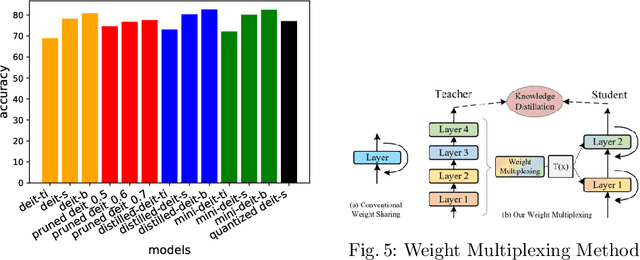
Abstract:Vision Transformers are increasingly embedded in industrial systems due to their superior performance, but their memory and power requirements make deploying them to edge devices a challenging task. Hence, model compression techniques are now widely used to deploy models on edge devices as they decrease the resource requirements and make model inference very fast and efficient. But their reliability and robustness from a security perspective is another major issue in safety-critical applications. Adversarial attacks are like optical illusions for ML algorithms and they can severely impact the accuracy and reliability of models. In this work we investigate the transferability of adversarial samples across the SOTA Vision Transformer models across 3 SOTA compressed versions and infer the effects different compression techniques have on adversarial attacks.
LDKP: A Dataset for Identifying Keyphrases from Long Scientific Documents
Apr 01, 2022
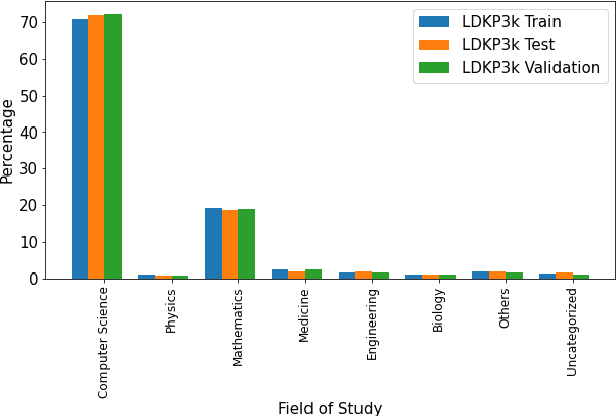
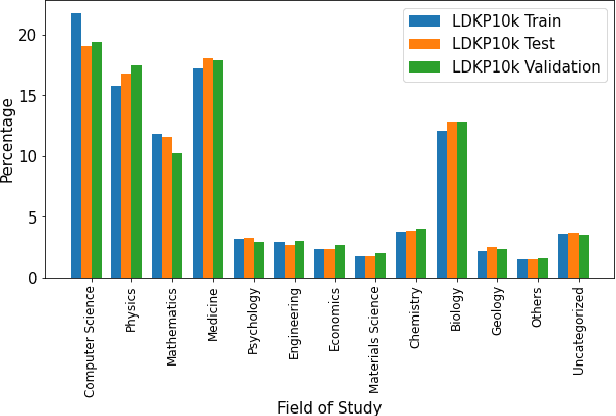

Abstract:Identifying keyphrases (KPs) from text documents is a fundamental task in natural language processing and information retrieval. Vast majority of the benchmark datasets for this task are from the scientific domain containing only the document title and abstract information. This limits keyphrase extraction (KPE) and keyphrase generation (KPG) algorithms to identify keyphrases from human-written summaries that are often very short (approx 8 sentences). This presents three challenges for real-world applications: human-written summaries are unavailable for most documents, the documents are almost always long, and a high percentage of KPs are directly found beyond the limited context of title and abstract. Therefore, we release two extensive corpora mapping KPs of ~1.3M and ~100K scientific articles with their fully extracted text and additional metadata including publication venue, year, author, field of study, and citations for facilitating research on this real-world problem.
AES Systems Are Both Overstable And Oversensitive: Explaining Why And Proposing Defenses
Oct 14, 2021



Abstract:Deep-learning based Automatic Essay Scoring (AES) systems are being actively used by states and language testing agencies alike to evaluate millions of candidates for life-changing decisions ranging from college applications to visa approvals. However, little research has been put to understand and interpret the black-box nature of deep-learning based scoring algorithms. Previous studies indicate that scoring models can be easily fooled. In this paper, we explore the reason behind their surprising adversarial brittleness. We utilize recent advances in interpretability to find the extent to which features such as coherence, content, vocabulary, and relevance are important for automated scoring mechanisms. We use this to investigate the oversensitivity i.e., large change in output score with a little change in input essay content) and overstability i.e., little change in output scores with large changes in input essay content) of AES. Our results indicate that autoscoring models, despite getting trained as "end-to-end" models with rich contextual embeddings such as BERT, behave like bag-of-words models. A few words determine the essay score without the requirement of any context making the model largely overstable. This is in stark contrast to recent probing studies on pre-trained representation learning models, which show that rich linguistic features such as parts-of-speech and morphology are encoded by them. Further, we also find that the models have learnt dataset biases, making them oversensitive. To deal with these issues, we propose detection-based protection models that can detect oversensitivity and overstability causing samples with high accuracies. We find that our proposed models are able to detect unusual attribution patterns and flag adversarial samples successfully.
MINIMAL: Mining Models for Data Free Universal Adversarial Triggers
Sep 25, 2021
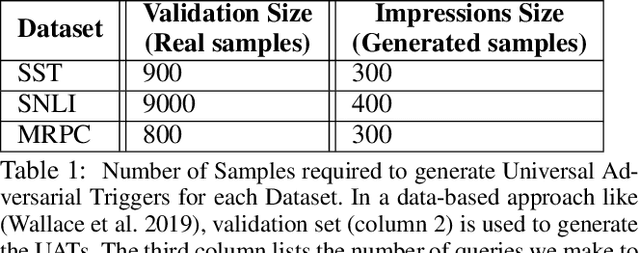
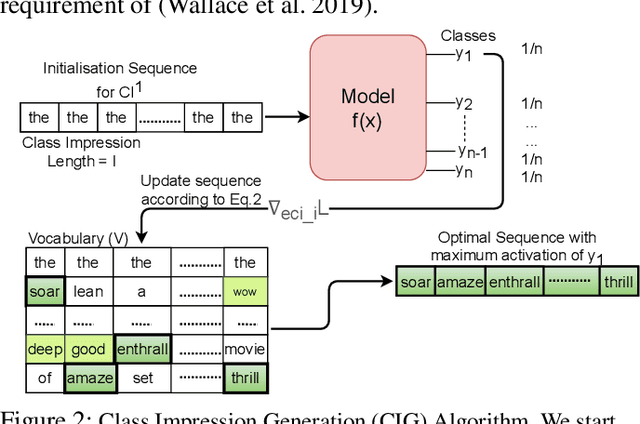

Abstract:It is well known that natural language models are vulnerable to adversarial attacks, which are mostly input-specific in nature. Recently, it has been shown that there also exist input-agnostic attacks in NLP models, called universal adversarial triggers. However, existing methods to craft universal triggers are data intensive. They require large amounts of data samples to generate adversarial triggers, which are typically inaccessible by attackers. For instance, previous works take 3000 data samples per class for the SNLI dataset to generate adversarial triggers. In this paper, we present a novel data-free approach, MINIMAL, to mine input-agnostic adversarial triggers from models. Using the triggers produced with our data-free algorithm, we reduce the accuracy of Stanford Sentiment Treebank's positive class from 93.6% to 9.6%. Similarly, for the Stanford Natural Language Inference (SNLI), our single-word trigger reduces the accuracy of the entailment class from 90.95% to less than 0.6\%. Despite being completely data-free, we get equivalent accuracy drops as data-dependent methods.
My Teacher Thinks The World Is Flat! Interpreting Automatic Essay Scoring Mechanism
Dec 27, 2020



Abstract:Significant progress has been made in deep-learning based Automatic Essay Scoring (AES) systems in the past two decades. However, little research has been put to understand and interpret the black-box nature of these deep-learning based scoring models. Recent work shows that automated scoring systems are prone to even common-sense adversarial samples. Their lack of natural language understanding capability raises questions on the models being actively used by millions of candidates for life-changing decisions. With scoring being a highly multi-modal task, it becomes imperative for scoring models to be validated and tested on all these modalities. We utilize recent advances in interpretability to find the extent to which features such as coherence, content and relevance are important for automated scoring mechanisms and why they are susceptible to adversarial samples. We find that the systems tested consider essays not as a piece of prose having the characteristics of natural flow of speech and grammatical structure, but as `word-soups' where a few words are much more important than the other words. Removing the context surrounding those few important words causes the prose to lose the flow of speech and grammar, however has little impact on the predicted score. We also find that since the models are not semantically grounded with world-knowledge and common sense, adding false facts such as ``the world is flat'' actually increases the score instead of decreasing it.
 Add to Chrome
Add to Chrome Add to Firefox
Add to Firefox Add to Edge
Add to Edge